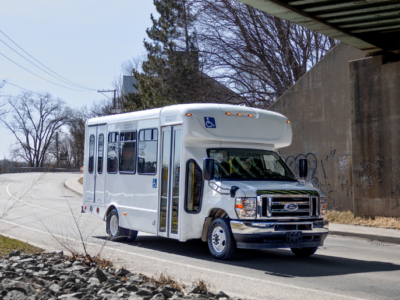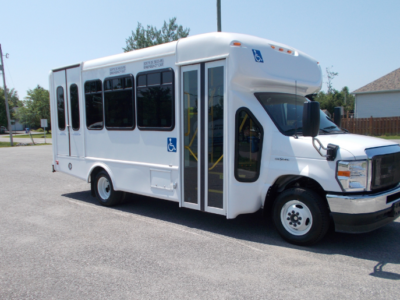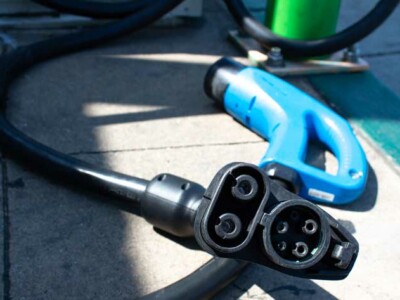Why should we go electric? While electric vehicles are gaining momentum on the road, charging stations are popping up everywhere, and subsidies are pouring in, we hear this question a lot from our customers. But, in the end, has someone truly explained the impact of transportation electrification? Our experts in electric bus solutions present five good reasons to consider electric for your next bus purchase.
Why you should switch to electric at a glance.
#1. Protect the planet.
Did you know that the transportation industry alone is responsible for 27% of greenhouse gas emissions in Canada? In the face of global warming issues, and for the sake of future generations, it is the responsibility of all of us to work together to reduce our emissions, especially as part of the transportation business. For example, one sole gas shuttle bus can generate 55 kg of CO2 per 100 km. Electric buses allow us to eliminate this harmful impact by avoiding burning fossil fuels and offering a zero-emission transportation solution. Even if fossil fuels are burned at the electrical generation station (which is common), the four-times greater efficiency of electric vehicles means that a much smaller amount of CO2 is generated. Of course, if your electricity comes from renewable sources such as solar, hydro or wind, there’s no CO2 generated at all! Choosing an electric bus is choosing a cleaner and brighter future for the next generations.
#2. Enhance people's quality of life.
In addition to relieving the global environment of greenhouse gas pollution generated by ICEs, opting for electric buses makes a positive impact directly on the lives of the people you serve. By adding electric buses to your fleet, you participate in ensuring a cleaner local environment.
- Improve the air quality for your surrounding communities by eliminating NOx and other smog-generating emissions.
- Reduce dangerous particulate matter (PM), such as microscopic soot which is directly harmful to health.
- Restore quiet in our cities and neighbourhoods by reducing noise pollution.
- Reduce the deposit of particles on the facades and sidewalks for a cleaner city.
- Provide a smoother and more pleasant ride for your passengers and your drivers, and a more reliable transit service (fewer service interruptions because of maintenance issues).
#3. Ease your operations.
Operating a fleet of electric buses is much more seamless compared to ICE (Internal Combustion Engine) vehicles.
For the driver, the ride is more pleasant and less noisy, but above all, it is at refuelling time that the difference is the most convincing. No more stops at the pump. As far as recharging is concerned, it’s even simpler: plug and charge is the most common system among minibus operators. So the system is a breeze whether you opt for overnight charging or a fast-charging station.
Now the most significant benefit of an electric bus is its low maintenance. Forget the oil changes, elude replacing all the filters, coils and spark plugs, or the transmission maintenance: all gone, with all the downtime this may cause if it breaks down. Electric bus and van units are also much easier to monitor. Onboard tech and software allow the e-bus manufacturer to track your system remotely so they can instantly flag a sudden loss in battery pack performance, for example. In other words, electric buses are smart buses. Their ability to collect data in real time will ease diagnostics, performance management and maintenance schedule. This onboard technology allows for personalized and timely customer service, helping you keep your fleet on the road.
Opting for an electric bus promises peace of mind, with fewer service interruptions for a more reliable transportation service for your users.
#4. Optimize your budget.
Cost-effectiveness is a primary driver of electric transition. You will never burn your dollars in gas again. Plus, you’ll never again be at the mercy of fluctuating oil prices to estimate your daily operating costs. Going electric reduces your geopolitical risk and allows you to rely on a much more stable energy price. Also, did you know that electric buses last longer, so you can amortize your investment over a more extended period of time? For example, battery packs last about 7 to 10 years. Also, electric buses’ motors have far fewer moving parts, meaning you will reduce both your consumption of spare parts and your maintenance needs. The perfect example is the brakes, which will last much longer because most of the braking is done by the motor during regenerative braking (which generates electricity onboard!). Bottom-line, you can count on a reduction of up to 85% of our operating costs and up to 66% of your maintenance costs.
Yes, for now, electric buses and vans are more expensive up-front than combustible engine vehicles; however, their total cost of ownership (TCO) is much lower.
#5. Get funding for your electric bus purchase.
Lastly, buying an electric bus allows you to leverage government funding to help fleet electrification. This abundance may not last, but for now, a pile of grants is available to encourage transit operators to electrify their fleet, whether for bus procurement or charging infrastructure.
So, always keep that in mind when you receive quotes from your bus dealer. An electric bus is more expensive than its conventional version. However, a big chunk of that invoice can be supported by the government. When looking for an electric bus for sale, ensure the model you are looking at is eligible for public incentives. Taking advantage of those programs can help you significantly reduce the acquisition cost of your vehicle and ease your transition to electric. Check the incentive available in your province here.




